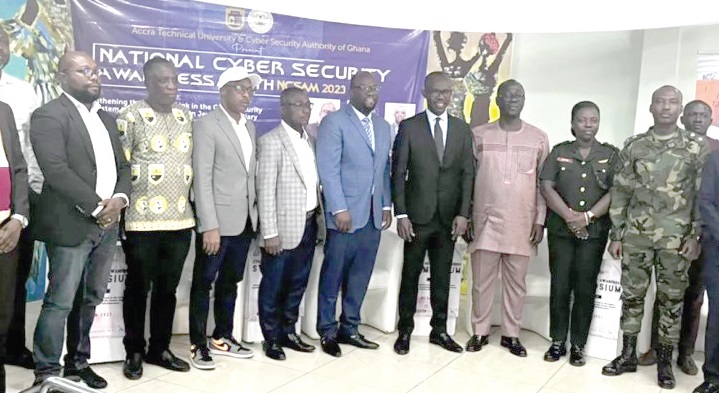
Be personally responsible for cyber security space - Dr Antwi-Boasiako to students
The public, particularly students, have been admonished to recognise that they are ultimately responsible for their personal cybersecurity.
It is, therefore, important for them to know and understand their internet access implications and the substantial risk it poses to them as users of digital devices .
The Director-General of Cyber Security Authority (CSA), Ghana, Dr Albert Antwi-Boasiako, who made the call, also said knowledge was key in protecting their personal information online.
“One of the weakest chain within the ecosystem of cybersecurity is humans, especially those within the educational community.
A community of enlightenment that one should have expected that the level of understanding the risk associated with cyberspace to be able to mitigate them with a minimum baseline safeguards are not there”, he stated.
Symposium
Dr Antwi-Boasiako was speaking at a cyber security awareness symposium for students organised by the Accra Technical University (ATU) and CSA, Ghana.
The symposium, which focused on promoting a culture of digital safety, was part of the Cyber Security month.
This year National Cyber Security Awareness Month (NCSAM), celebrated every October, seeks to highlight the importance of cultivating a collective mindset and behaviour that values and promotes responsible online practices, cybersecurity awareness, and the protection of personal information.
It was on the theme: “Strengthening the weakest link in the cyber security ecosystem to protect the Crown Jewels of tertiary education infrastructure.”
Risk environment
Dr Antwi-Boasiako noted that the most visited sites in the country included porn sites and sports betting sites, stressing that, particularly, the pornography sites were considered to be a risk environment for cyber attacks because they were highly concentrated with malicious programmes.
“Crime is a rational activity and that those behind the crime are also invested.
They see the numbers and know the top websites in Ghana which is where they are likely to advocate.
So here you are, using a device visiting these sites and you do not have protection.
That is the state of our insecurity as people”, he explained.
An officer at CSA, Ghana, Stephen Cudjoe-Seshie, who spoke on Cyber hygiene, described it as an array of practices to minimise the risk of security crises.
He said there were a number of defences one could take to protect themselves against cyber attacks, listing some of these to include installing antivirus and malware software to scan for viruses, updating apps, web browsers, and operating systems on all devices regularly, using firewalls to stop unauthorised users from getting information and most, importantly, changing passwords and using multifactor authentication on all your devices.
“So if you use online services, be careful how much you share out there.
A lot of us are on social media, such as Facebook, Instagram, Snapchat and the others; the data you share practically stays there forever”, he added.
Proactive
The Acting Vice Chancellor of ATU, Professor Amevi Acakpovi, said security was an ongoing, proactive effort that required constant vigilance.
He explained that cybersecurity awareness involved respecting the privacy and security of others and fostering a culture of digital responsibility.
“We need to recognise that our virtual world is as real as the physical one, and thus susceptible to threats and vulnerabilities”, he stated.
This, Prof Acakpovi noted, extended to how data was collected, stored, and shared, emphasising the importance of ethical practices in the digital realm.
“The realm of cybersecurity is ever-evolving.
Hence, the need for continuous dialogue, the dissemination of knowledge, the exploration of emerging trends, and the sharing of best practices are not just a necessity; it is our moral and ethical obligation to future generations”, he added.
